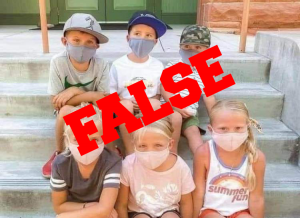Does wearing a mask make children more vulnerable to sex trafficking?

Recent posts on social media have suggested that children wearing face masks will make them more at risk of becoming a victim of kidnapping or child sex trafficking. This is false.
It’s important to have the facts about children that are more at risk for sex trafficking. Traffickers prey on vulnerable children. This includes children and adolescents with low social supports, who have a history of sexual or physical abuse, or have a history in the foster care system or juvenile detention. The average age of a child entering human trafficking is 14-16 years old. Common places for recruitment include schools, bus stations, homeless shelters, shopping centers, and the internet.
The “snatch and grab” stories of sex trafficking that are often shared on social media are very rare. Most children who become victims of sex trafficking are groomed by older adults who provide a promise of relationship, love, or other means of support. Source
There is no factual basis in the idea that children wearing face masks will make them more vulnerable to sex trafficking. Face masks are an important public health measure to mitigate the spread of COVID-19. Many studies have shown them to be effective at minimizing transmission, particularly when everyone is wearing them, even those who are asymptomatic. Recent studies show that children are likely to transmit coronavirus just as easily as adults. Source
There are many signs of child abuse that are not obscured by a child wearing a mask. Prevent Child Abuse Iowa has long advocated for adult-focused sexual abuse prevention. Safety from sexual abuse and exploitation begins by equipping adults with skills to recognize behaviors indicating abuse, providing training on appropriate interventions, and understanding systems of reporting.
There are many socio-economic factors related to COVID-19 that DO provide more opportunities for abuse and child sexual exploitation. More children are isolated and removed from social supports that would otherwise exist in schools, summer programs, and community services and that may increase their risk of being abused. It is critically important that our communities are responding to this increased risk by supporting kids and families.
We know that the presence of one caring and supportive relationships can change the world for a child that needs extra support. The success of our community relies on each of us to build connections that will strengthen families and build happy and safe childhoods for our kids.
Learn more about training opportunities to educate your community about sexual abuse prevention on our website. The Iowa Network Against Human Trafficking is also a great source for education, training, and advocacy work related to human trafficking.
